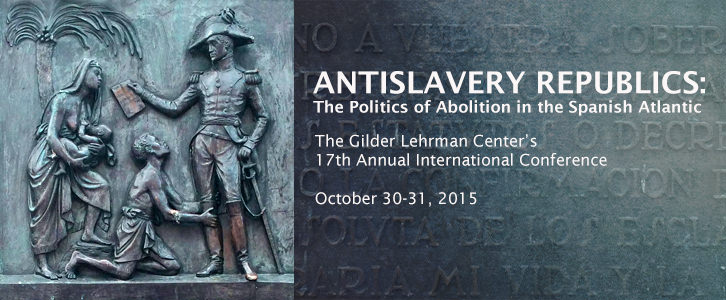2015 GLC International Conference Schedule
Luce Hall Auditorium
34 Hillhouse Avenue
New Haven, CT
Why and how did slavery end when it did in Spanish America? Slavery expanded in leaps and bounds in Brazil, Cuba, and the United States during the same decades that the new republics of mainland Spanish America professed a commitment to the abolition of slavery and instituted gradual antislavery laws. In large part this was a result of the free and enslaved Africans’ involvement in the independence wars in places such as Colombia, Mexico, Peru, Uruguay, and Venezuela. This conference will focus on the history of slavery and anti-slavery in the nineteenth century Spanish Atlantic world and probe such hemispheric contrasts and divergences by moving beyond a national or imperial focus that has characterized abolitionist studies. Instead, it will trace the connections of mainland Spanish America with Brazil, Africa, Haiti, Britain, the Spanish Caribbean, and the United States during the nineteenth century.
FRIDAY, OCTOBER 30
8:30 – 9:00 a.m. Coffee and Registration
9:00 – 10:45 a.m. Slavery and Abolition in Latin America
-
Marcela Echeverri, Yale University, “Slavery and Anti-Slavery in the Spanish American Republics during the Nineteenth Century”
-
Carlos Aguirre, University of Oregon, “Abolition in Spanish America: Rethinking Slave Agency”
-
George Reid Andrews, University of Pittsburgh, “Spanish American Abolition: Three Connections”
-
Chair: David W. Blight, Yale University
10:45 – 11:00 a.m. Coffee Break (Luce Hall Common Room)
11:00 a.m. – 1:00 p.m. The Slave Trade
-
Alex Borucki, University of California-Irvine, “Atlantic History and the Slave trade to Spanish America”
-
John Harris, Johns Hopkins University, “Circuits of Wealth, Circuits of Sorrow: Financing the Illegal Transatlantic Slave Trade to Cuba, 1850-1867”
-
Richard Huzzey, University of Liverpool, “The Anti-Slavery Empire and the Anti-Slavery Republics: British Suppression of the Slave Trade in the nineteenth-century Atlantic World”
-
Chair: David W. Blight, Yale University
1:00 – 2:30 p.m. Lunch (Luce Hall Common Room)
2:30 – 4:30 p.m. Spanish American Slavery in the 19th Century
-
Alice Baumgartner, Yale University, “Rethinking Abolition in Mexico”
-
Alejandro Gómez, Université de Lille, “Attitudes and Sensibilities Towards Coloured Afro-Descendants in the Revolutionary Spanish Atlantic, 1781-1854”
-
Justin Wolfe, Tulane University, “Slavery and the Politics of Race in 19th-Century Central America”
-
Chair: Alejandra Dubcovsky, Yale University
SATURDAY, OCTOBER 31
9:00 – 9:30 a.m. Coffee and Registration
9:30 – 11:30 a.m. The Second Slavery
-
Ada Ferrer, New York University, “Islands of Freedom and Unfreedom: On the Time and Space of Cuban Slavery”
-
Rafael Marquese, Universidade de São Paulo, “The Other Side of the Antislavery Republics: The Empire of Brazil and the Making of the Second Slavery”
-
Dale Tomich, Binghamton University, “Anti-Slavery, the Inter-State System, and British Hegemony in the “Age of Revolution”
-
Chair: Edward Rugemer, Yale University
11:30 a.m. – 12:45 p.m. Lunch (Luce Common Room)
12:45 – 2:45 p.m. Atlantic Abolition
-
Peter Blanchard, University of Toronto, “Slave Militancy and the Abolition of Slavery in Spanish South America”
-
Anne Eller, Yale University, “Abolition and Emancipation in the “Non”-Plantation Caribbean”
-
Roquinaldo Ferreira, Brown University, “Enslaved Africans’ Agency and the Abolition of the Transatlantic Slave Trade in Central Africa (Angola and Congo)”
-
Chair: Stuart Schwartz, Yale University
2:45 – 3:00 p.m. Coffee break
3:00 – 4:30 p.m. Concluding Roundtable: Slavery, Abolition, and Memory
-
Ana Lucia Araujo, Howard University, “Slavery, Abolitions, and the Politics of Public Memory in the Atlantic World”
-
Herman Bennett, City University of New York
-
Bayo Holsey, Rutgers University
-
Moderator: David W. Blight, Yale University
